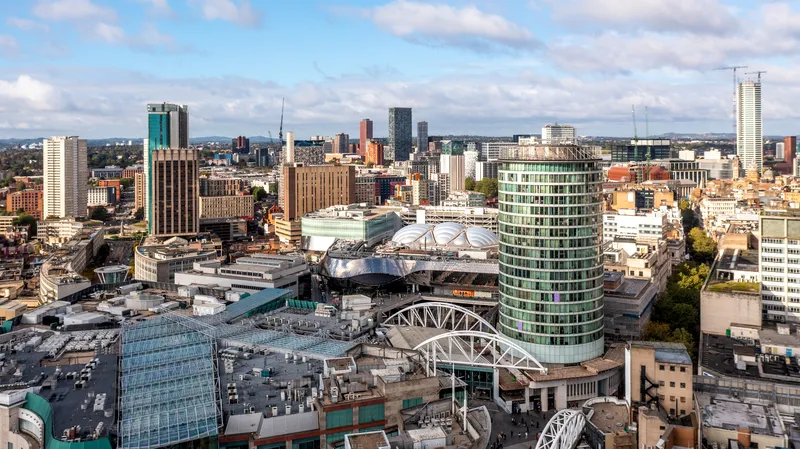A white paper setting out Birmingham’s 20-year vision for improving transport across the city is set to be unveiled today.
Birmingham Connected aims to make the city safer and easier to travel around by reducing congestion and promoting more sustainable forms of transport.
Initiatives in the plan include the completion of a US$1.9 billion public transport network within 20 years and the development of Green Travel Districts to enable people to walk, cycle or take public transport safely. A feasibilit
November 14, 2014
Read time: 3 mins
A white paper setting out Birmingham’s 20-year vision for improving transport across the city is set to be unveiled today.
Birmingham Connected aims to make the city safer and easier to travel around by reducing congestion and promoting more sustainable forms of transport.
Initiatives in the plan include the completion of a US$1.9 billion public transport network within 20 years and the development of Green Travel Districts to enable people to walk, cycle or take public transport safely. A feasibility study is to be carried out in 2015.
Plans also include developing a strategy for the long-term future and role of the A38 through the city, including consulting on options such as substantial redesign and redirecting through traffic on to either a substantially upgraded ring road or new, longer tunnels under the city. Consultation will begin in 2015.
Other initiatives include improving rail links across the city and beyond an investment package to deliver Birmingham’s local connectivity strategy for HS2 and the promotion of a Low Emissions Zone in the city centre to improve air quality and help Birmingham City Council meet carbon reduction targets.
Council leader Sir Albert Bore said: “Birmingham Connected sets a new direction for transport, not just for tomorrow but for the next 20 years. It ushers in a new era in the way we think about moving people and goods from, into, around and through the city and region, delivering projects and infrastructure, and the ways in which we fund them.”
Councillor Tahir Ali, cabinet member for Development, Transport and the Economy, said: “Our vision is to create a transport system, which puts the user first and delivers the connectivity that local people and businesses require.”
Transport Secretary Patrick McLoughlin said: “The government has put transport at the heart of its long term economic plan, because the future of successful cities depends on efficient transport that can connect people with jobs, link communities with services and attract new investment.”
However, the6983 Freight Transport Association (FTA) believes that the white paper leaves more questions than answers regarding freight movements.
Sally Gilson, FTA policy manager – Midlands said: “Whilst it is positive that the movement of goods is being viewed as a priority in the Birmingham Connected action plan and prioritising freight during off peak times is a step in the right direction, it is during the peak times that freight has issues.”
“FTA engaged with Birmingham City Council throughout the consultation process and will continue to offer support and advice in helping achieve efficient freight movements in and around Birmingham. I look forward to seeing further detail regarding the freight strategy.”
Birmingham Connected aims to make the city safer and easier to travel around by reducing congestion and promoting more sustainable forms of transport.
Initiatives in the plan include the completion of a US$1.9 billion public transport network within 20 years and the development of Green Travel Districts to enable people to walk, cycle or take public transport safely. A feasibility study is to be carried out in 2015.
Plans also include developing a strategy for the long-term future and role of the A38 through the city, including consulting on options such as substantial redesign and redirecting through traffic on to either a substantially upgraded ring road or new, longer tunnels under the city. Consultation will begin in 2015.
Other initiatives include improving rail links across the city and beyond an investment package to deliver Birmingham’s local connectivity strategy for HS2 and the promotion of a Low Emissions Zone in the city centre to improve air quality and help Birmingham City Council meet carbon reduction targets.
Council leader Sir Albert Bore said: “Birmingham Connected sets a new direction for transport, not just for tomorrow but for the next 20 years. It ushers in a new era in the way we think about moving people and goods from, into, around and through the city and region, delivering projects and infrastructure, and the ways in which we fund them.”
Councillor Tahir Ali, cabinet member for Development, Transport and the Economy, said: “Our vision is to create a transport system, which puts the user first and delivers the connectivity that local people and businesses require.”
Transport Secretary Patrick McLoughlin said: “The government has put transport at the heart of its long term economic plan, because the future of successful cities depends on efficient transport that can connect people with jobs, link communities with services and attract new investment.”
However, the
Sally Gilson, FTA policy manager – Midlands said: “Whilst it is positive that the movement of goods is being viewed as a priority in the Birmingham Connected action plan and prioritising freight during off peak times is a step in the right direction, it is during the peak times that freight has issues.”
“FTA engaged with Birmingham City Council throughout the consultation process and will continue to offer support and advice in helping achieve efficient freight movements in and around Birmingham. I look forward to seeing further detail regarding the freight strategy.”







